Microsoft Azure
Let’s explore the Microsoft Azure Certifications available for 2022 based on certification level and role.
At the end, we’ve included Azure Certification resources to help you succeed in your certification.
Keep Reading….
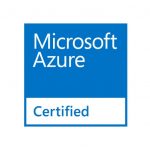
Why Should I Get a Microsoft Azure Certification?
There are many reasons to get a Microsoft Azure certification.
With the digital environment changing faster than ever, driven by both internal and external forces, IT certification, knowledge, and readiness are more valuable than ever to both the individual employee and the IT organization. Cloud, wireless, hybrid work, advances in data management, security, all demand more nimble, skilled IT teams. Being ready for what’s now and what’s next requires both skill and an attitude that values continual learning.
While it would seem that developing a growth mindset that values continued certification would have benefits to the individual employee, when they are actually quantified, their importance takes on a larger scale. For instance, once a certification candidate sets out a career goal that involves certification promotion, pay raise, new role they are far more likely to achieve it. A majority of candidates (70%) successfully fulfilled these primary goals. Only three percent did not.
Show me the money: The monetary benefits of certification:
For those employees who are looking to earn more money, certification is an important part of any plan, with 28% of employees receiving a salary or wage increase after earning a certification. 5 Of those earning a raise 50% of candidates receive a pay increase of between 6% to 20%. 6 And it happens fast; 55% of those getting raises after certifications get them within three months.
Personal benefits: Be the tech pro you want to be:
Microsoft states that an Azure Certification demonstrates that you’re proficient in the specific, real-world skills associated with recognized industry roles.
According to a survey conducted by Peason Vue, 91% responded that they feel an increase in confidence level and 76% felt a greater job satisfaction.
Why Should my employees get a Microsoft Azure Certification?
According to a survey by Pearson Vue,
71%
of companies are encouraging credentials and
65%
use certification as a mentoring tool.
Also, over half of the companies feel that a Microsoft Azure Certification improves the interviewing process.
When individuals within an organization pursue certifications, the organization as a whole benefits, too. In general, these benefits come from three main areas where organizations benefit from improving skills and knowledge:
Timeliness
Well trained cloud migration teams meet nearly 90% of their business and project milestones. Compared with less than 50% of milestones met by cloud migration teams at only “average” skill level.
Insight
Nearly all (90%) of the organizations with well trained teams are satisfied or very satisfied with their ability to monitor, forecast, and optimize server, storage, and network resources. Compared with less than 10% of the organizations with undertrained teams being satisfied with their ability to optimize resources.
Business impact
Of the organizations with teams well trained in automation and orchestration tools, 80% report being satisfied or very satisfied with the business impact of the move to cloud. Only 20% of the organizations without sufficient skills were satisfied with the impact of cloud.
There are Different Levels of Microsoft Azure Certification
- Fundamentals
- Associate
- Expert
- Specialty
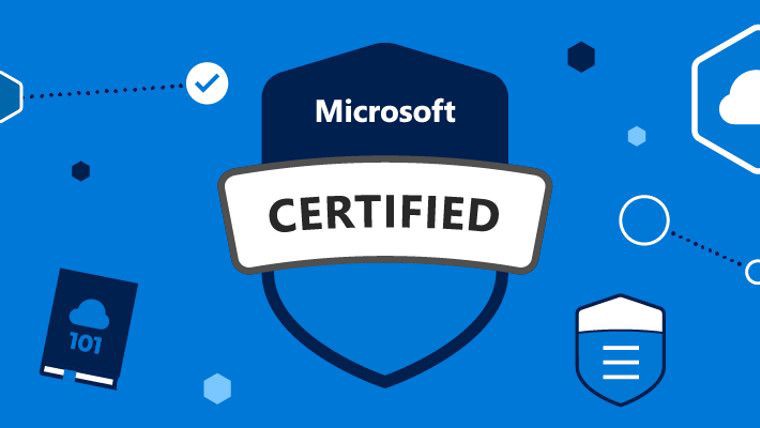
Fundamentals Azure Certification

This Microsoft Azure Certification is a recommended start.
It is ideal for individuals just starting in technology or thinking about a career change.
AZ-900 Azure Fundamentals
Prepare for the AZ-900 exam. This two-day Azure Fundamentals Training course will provide foundational level knowledge on cloud concepts; core Azure services; security, privacy, compliance, and trust; and Azure pricing and support.
Note: This AZ-900 course provides an Azure pass and time for students to participate in hands-on labs.
AI-900 Azure AI Fundamentals
This Azure AI Fundamentals course introduces fundamentals concepts related to artificial intelligence (AI), and the services in Microsoft Azure that can be used to create AI solutions.
This AI-900 Azure AI Fundamentals course is not designed to teach students to become professional data scientists or software developers, but rather to build awareness of common AI workloads and the ability to identify Azure services to support them.
This Azure AI Fundamentals course is designed as a blended learning experience that combines instructor-led training with online materials on the Microsoft Learn platform.
The hands-on exercises in the course are based on Learn modules, and students are encouraged to use the content on Learn as reference materials to reinforce what they learn in the class and to explore topics in more depth.
DP-900 Azure Data Fundamentals
In this Azure Data Fundamentals course, students will learn the fundamentals of database concepts in a cloud environment, get basic skilling in cloud data services, and build their foundational knowledge of cloud data services within Microsoft Azure.
Students will identify and describe core data concepts such as relational, non-relational, big data, and analytics, and explore how this technology is implemented with Microsoft Azure. They will explore the roles, tasks, and responsibilities in the world of data.
The students will explore relational data offerings, provisioning and deploying relational databases, and querying relational data through cloud data solutions with Microsoft Azure. They will explore non-relational data offerings, provisioning and deploying non-relational databases, and non-relational data stores with Microsoft Azure.
Students will explore the processing options available for building data analytics solutions in Azure. They will explore Azure Synapse Analytics, Azure Databricks, and Azure HDInsight. Students will learn what Power BI is, including its building blocks and how they work together.
SC-900 Security, Compliance, and Identity Fundamentals
This Security, Compliance, and Identity Fundamentals course provides foundational level knowledge on security, compliance, and identity concepts and related cloud-based Microsoft solutions.
How many learning hours are necessary to pass the exam on the first attempt?
Everyone’s learning style and grasping power are different. So learning hours may vary from individual. However, on average, a person studying 17-20 hours can pass the exam on the first attempt.
How long does it take to complete the application process?
It takes typically five business days to complete the application process. Application processes submitted by mails usually take 10 business days. But corporate applications submitted by mail may take up to 20 business days.
Associate Azure Certification
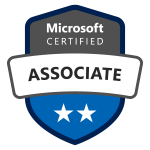
Associate certifications are broken down by roles and generally require a single exam.
See the section below on role-based Azure Certifications.
AZ-104 Azure Administrator Associate
This Azure Administrator Associate course teaches IT Professionals how to manage their Azure subscriptions, secure identities, administer the infrastructure, configure virtual networking, connect Azure and on-premises sites, manage network traffic, implement storage solutions, create and scale virtual machines, implement web apps and containers, back up and share data, and monitor your solution.
AZ-204 Azure Developer Associate
This Azure Certification Training course teaches developers how to create end-to-end solutions in Microsoft Azure.
Students will learn how to implement Azure compute solutions, create Azure Functions, implement and manage web apps, develop solutions utilizing Azure storage, implement authentication and authorization, and secure their solutions by using KeyVault and Managed Identities.
AZ-500 Azure Security Engineer Associate
In this Azure Security Technologies course students will gain the knowledge and skills needed to implement security controls, maintain the security posture, and identify and remediate vulnerabilities by using a variety of security tools.
The course covers scripting and automation, virtualization, and cloud N-tier architecture.
AI-102 Azure AI Engineer Associate
AI-102 Designing and Implementing an Azure AI Solution is intended for software developers wanting to build AI infused applications that leverage Azure Cognitive Services, Azure Cognitive Search, and Microsoft Bot Framework.
The course will use C# or Python as the programming language
DP-100 Azure Data Scientist Associate
In this Designing and Implementing a Data Science Solution on Azure course, you will learn how to operate machine learning solutions at cloud scale using Azure Machine Learning.
This course teaches you to leverage your existing knowledge of Python and machine learning to manage data ingestion and preparation, model training and deployment, and machine learning solution monitoring in Microsoft Azure.
DP-203 Azure Data Engineer Associate
In this Data Engineering on Microsoft Azure course, the student will learn about the data engineering patterns and practices as it pertains to working with batch and real-time analytical solutions using Azure data platform technologies.
Students will begin by understanding the core compute and storage technologies that are used to build an analytical solution.
DP-300 Azure Database Administrator Associate
This Administering Relational Databases on Microsoft Azure course provides students with the knowledge and skills to administer a SQL Server database infrastructure for cloud, on-premises and hybrid relational databases and who work with the Microsoft PaaS relational database offerings. Additionally, it will be of use to individuals who develop applications that deliver content from SQL-based relational databases.
Expert Azure Certification
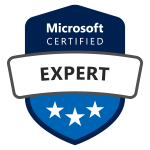
Expert certification often requires two or more exams to acquire.
AZ-305 Azure Solutions Architect Expert
This Microsoft Azure Architect Design course teaches Azure Solution Architects how to design infrastructure solutions. Course topics cover governance, compute, application architecture, storage, data integration, authentication, networks, business continuity, and migrations. The course combines lecture with case studies to demonstrate basic architect design principles.
* Requires one Azure Administrator Associate certification + the AZ-305 exam
AZ-400 Azure DevOps Engineer Expert
This Designing and Implementing Microsoft DevOps Solutions course provides the knowledge and skills to implement DevOps processes. Students will learn how to use source control, scale Git for an enterprise, and implement and manage build infrastructure.
This course provides the knowledge and skills to design and implement DevOps processes and practices.
* Requires either one Azure Developer Associate certification or one Azure Administrator Associate certification + the AZ-400 exam
Specialty Azure Certification
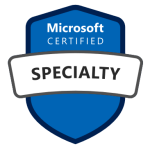
As opposed to more general certifications, specialty certifications
have a narrow technology focus.
AZ-120 Azure for SAP Workloads Specialty
This Planning and Administering Microsoft Azure for SAP Workloads teaches IT Professionals experienced in SAP solutions how to leverage Azure resources that include deployment and configuration of virtual machines, virtual networks, storage accounts, and Azure AD that includes implementing and managing hybrid identities.
AZ-220 Azure IoT Developer Specialty
This Microsoft Azure IoT Developer course provides students with the skills and knowledge required to successfully create and maintain the cloud and edge portions of an Azure IoT solution.
The course includes full coverage of the core Azure IoT services such as IoT Hub, Device Provisioning Services, Azure Stream Analytics, Time Series Insights, and more.
AZ-140 Azure Virtual Desktop Specialty
This Configuring and Operating Microsoft Azure Virtual Desktop course teaches Azure administrators how to plan, deliver, and manage virtual desktop experiences and remote apps, for any device, on Azure.
Students will learn through a mix of demonstrations and hands-on lab experiences deploying virtual desktop experiences and apps on Windows Virtual Desktop and optimizing them to run in multi-session virtual environments.
MB-260 Customer Data Platform Specialty
Customer Data Platform specialists implement solutions that provide insight into customer profiles and that track engagement activities to help improve customer experiences and increase customer retention. In this Customer Data Platform Specialty course, students will learn about the Dynamics 365 Customer Insights solution, including how to unify customer data with prebuilt connectors, predict customer intent with rich segmentation, and maintain control of customer data.
This course begins with importing and transforming your customer data and culminates with extending your customer data platform solution into the Power Platform and Dynamics 365 applications.
DP-420 Azure Cosmos DB Developer Specialty
This Designing and Implementing Cloud-Native Applications Using Azure Cosmos DB
course teaches developers how to create application using the SQL API and SDK for Azure Cosmos DB. Students will learn how to write efficient queries, create indexing policies, manage and provisioned resources, and perform common operations with the SDK.
Microsoft Azure Certification exam paths are broken down into roles
- Developer
- Administrator
- Solution Architect
- Data Engineer
- Data Scientist
- AI Engineer
- DevOps Engineer
- Security Engineer
Developer
Developers design, build, test, and maintain cloud solutions.
- AZ-900 Azure Fundamentals
- DP-900 Azure Data Fundamentals
- AI-900 Azure AI Fundamentals
- AZ-220 Azure IoT Developer Specialty
- DP-420T00 Designing and Implementing Cloud-Native Applications Using Azure Cosmos DB
Administrator
Administrators implement, monitor, and maintain Microsoft solutions.
- AZ-104 Azure Administrator Associate
- AZ-120 Planning and Administering Microsoft Azure for SAP Workloads
- AZ-140 Azure Virtual Desktop Specialty
- AZ-600 Azure Stack Hub Operator Associate
- AZ-700 Designing and Implementing Microsoft Azure Networking Solutions
- AZ-800 Administering Windows Server Hybrid Core Infrastructure
- AZ-801 Configuring Windows Server Hybrid Advanced Services
- SC-300 Microsoft Identity and Access Administrator
Solution Architect
Solutions architects have expertise in compute, network, storage, security.
- AZ-305 Microsoft Azure Architect Design
- AZ-120 Planning and Administering Microsoft Azure for SAP Workloads
- PL-600 Power Platform Solution Architect
- DP-420T00 Designing and Implementing Cloud-Native Applications Using Azure Cosmos DB
- AZ-010 Azure Administration for AWS SysOps
- AZ-020 Microsoft Azure solutions for AWS developers
- AZ-030 Microsoft Azure technologies for AWS architects
Data Engineer
Data engineers design and implement the management, monitoring, security, and privacy of data using the full stack of data services.
- DP-900 Azure Data Fundamentals
- DP-203 Azure Data Engineer Associate
- DP-050 Migrate SQL workloads to Azure
- DP-080 Querying Data with Microsoft Transact SQL
- DP-090 Implementing a Machine Learning Solution with Microsoft Azure Databricks
- DP-420 Designing and Implementing Cloud-Native Applications Using Microsoft Azure Cosmos DB
Data Scientist
DevOps engineers combine people, process, and technologies to continuously deliver valuable products and services that meet end user needs and business objectives.
- AI-900 Azure AI Fundamentals
- DP-100 Azure Data Scientist Associate
AI Engineer
AI engineers use Cognitive Services, Machine Learning, and Knowledge Mining to architect and implement Microsoft AI solutions.
- AI-900 Azure AI Fundamentals
- AI-102 Designing and Implementing a Microsoft Azure AI Solution
DevOps Engineer
Solutions architects have expertise in compute, network, storage, security.
- AZ-400 DevOps Engineer Expert
Security Engineer
Security engineers implement security controls and threat protection, manage identity and access, and protect data, applications, and networks.
- SC-200 Security Operations Analyst Associate
- SC-300 Microsoft Identity and Access Administrator
- AZ-800 Administering Windows Server Hybrid Core Infrastructure Training
- AZ-500 Azure Security Engineer Associate
Get started today to boost your career and position yourself for growth in the long run.
Who you learn from matters.
Microsoft Azure Certification training with Web Age will prepare you for the roles that employers are looking to fill.
Contact us to learn more about the exciting opportunities ahead for you with Microsoft Azure Certification Training.
The best part of Microsoft Azure Certifications?
Microsoft training with Web Age does more than just build technical skills. Microsoft Azure Certification training with Web Age includes problem-solving and critical thinking, as well as technical specializations, hands-on experience and practice requirements, which help you skill up for in-demand jobs. Our content and assessments are kept up-to-date to meet industry demands to help you stay current.
10 Things You Get From Holding Microsoft Certifications
- Recognition from an industry leader
- A solid foundation
- The job you’ve always wanted
- Higher earnings
- Highly desirable new skills
- A new career path, if you want one 7. Earn credibility in the cloud era
- The endless admiration of your employer
- Confidence and excitement about your career
- “I told you so” from your colleagues
